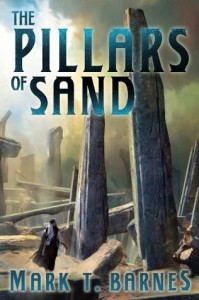 This time, I’m just going to gush. I get some good books from Library Journal, and some not so good books from Library Journal. And every once in a while, I get one that absolutely blows me away. That was The Garden of Stones by Mark T. Barnes. I adore epic fantasy, and Garden was one of the best I’ve read in a long time.
This time, I’m just going to gush. I get some good books from Library Journal, and some not so good books from Library Journal. And every once in a while, I get one that absolutely blows me away. That was The Garden of Stones by Mark T. Barnes. I adore epic fantasy, and Garden was one of the best I’ve read in a long time.
I begged 47North for a review copy of book 2, The Obsidian Heart, because I couldn’t bear not knowing where the story went after the towering cliffhanger I was left with. It was every bit as awesome as Garden, and now we have The Pillars of Sand. Read today’s review to see just how much I loved it.
Making Your Own Mythology, by Mark T. Barnes.
Myths are ancient stories shared through generations, both within and across cultures. While history relates the facts of the past, myths reveal the truths of personalities, beliefs, hopes, and fears of times gone by. Myths help us understand why we are who we are, in the context of our journey through history and cultural transformation.
Fantasy worlds in particular benefit from a strong and original mythology as part of the world building process. Not only do they add depth and texture to a story, they provide a framework for the reader to know why things are the way they are. It’s important for our characters to reflect in some way the thinking of their age, which has been formed from cultural mores and social interactions over hundreds of preceding generations.
It’s important to find the obvious in our mythologies and do something different with them. Readers may know the content of many myths, morality tales and fairy tales already, so reward them with something new. Find the anchor points a reader will care about, and identify with, and build a mythology around them. Look at the important concepts of our own culture: how we view birth, life, and death. Love and hatred, romance and vengeance. What do we fear? What do we despise, and why do these things have such a visceral effect on us? Look at topical issues that are important to us today, and weave those into a mythology to make it meaningful and impactful.
Mythology in fantasy literature can also have us think about our own origins as well as the stories we’re leaving behind for generations to come. The myths we make will inform others what we valued, what we feared, and helps them learn the truths of who we were and the mark we left a changing world.
The world of Īa in the Echoes of Empire series has a layered history. All the great world events lend to myths, and how those myths are remembered and used. In the EoE series I tried a few new things:
- No orthodox religion or deities of any kind. The native inhabitants of Īa practice a form of natural reverence. With the introduction of humans who came from a technologically advanced society with less of a focus on religion, there came the concept of Ancestor worship. As people we have strong feelings towards the people in our lives, and time and new circumstances altered how the dead are perceived.
- No heaven or hell. There’s no great reward for being ‘good’, nor damnation for being ‘bad’. Such reference points are meaningless when a person is capable of thought, free will, and change. The dead go to a place called The Well of Souls where they continue to be the people they were in life, sans a body. Knowledge of the Well of Souls and the ability to communicate with the dead has taken some of the fear from death.
- The world is alive and conscious. There have been many empires and civilisations resting one atop the other like sediment. In the distant past the high water mark of a dead civilisation managed to communicate with the mind of the world, changing forever their view of their place and status. Technological industrialisation was bypassed in favour of arcane industrialisation, where energy sources were renewable gifts from the world itself. Humans changed this paradigm, and their defeat in the old wars became a parable for how civilisation should work with a world that knows what’s being done to it.
- Power perceived is power achieved. The Insurrection and The Scholar Wars showed the world that the arcane sciences are devastating and that not all who hold power, should. Centuries after The Scholar Wars there are still prejudices and laws in place against some uses for the arcane.
- Tales of ethics and morality. The wars of the past and the blood that was shed has led to the Avān, one of the world’s predominant cultures, forming a rigorous code of conduct and caste system in order to protect themselves, from themselves. Other cultures have beliefs based on great acts of invention, or heroism, or generosity. The greatest heroes in the EoE world are scholars, philosophers, courtesans, etc. Generally people who have tried to make the world better through less destructive means than war.
- The lessons of war and envy. Though the humans were defeated in the old wars, the Elemental Masters of the time took notice. Indeed it was the introduction of advanced technology that inspired some of the Elemental Masters to try new things with the arcane, and to start truly bridging the gap between arcane science and technical science. This also introduced the concept of Wars of the Long Knife (Wars of Assassins), trial by single combat or arcane power to resolve disputes, government sanctioned and arbitrated House wars, etc.
Seeding the histories of our fantasy worlds with pivotal moments and people, and having those nexus points reflected throughout the years to follow, gives our worlds depth and texture. Whenever I pick up a fantasy novel I look forward to seeing where the writer is taking me, and how well their characters and story are in touch with their myths, legends, and origins.
 Mark Barnes lives in Sydney, Australia. He is the author of the epic fantasy Echoes of Empire series, published by 47North. The series includes The Garden of Stones (released May 2013), and The Obsidian Heart (released October 2013). The Pillars of Sand is the third of the series, due for release in May 2014. In April 2014, The Garden of Stones was selected as one of five finalists in the 2013/2014 David Gemmell MORNINGSTAR Award for Best Newcomer/Debut, with the winner to be announced in London in June 2014.
Mark Barnes lives in Sydney, Australia. He is the author of the epic fantasy Echoes of Empire series, published by 47North. The series includes The Garden of Stones (released May 2013), and The Obsidian Heart (released October 2013). The Pillars of Sand is the third of the series, due for release in May 2014. In April 2014, The Garden of Stones was selected as one of five finalists in the 2013/2014 David Gemmell MORNINGSTAR Award for Best Newcomer/Debut, with the winner to be announced in London in June 2014.~~~~~~GIVEAWAY~~~~~~
Mark and his publisher, 47North, are generously giving away 5 NetGalley copies of each book in The Echoes of Empire trilogy! If you love epic fantasy, this is your chance to start (or complete) the series.
Because the copies are NetGalley downloads, winners will need to join or be members of NetGalley (which is free).
a Rafflecopter giveaway









Fascinating views on creating mythology, religion, and a living world in EoE. I have adored the series and encourage everyone to give it a try. Hopefully, the story of Indris and Mari and this world will continue in the near future. I can’t wait to see what happens next.
My new favorite is Gail Z Martins Ice Forged.